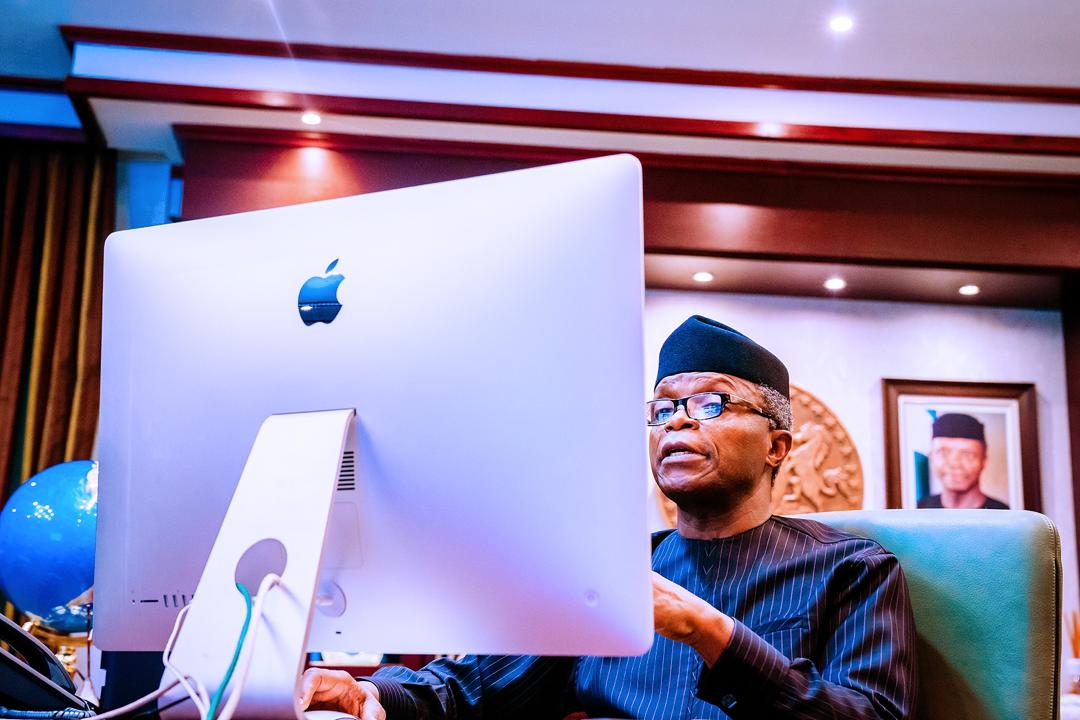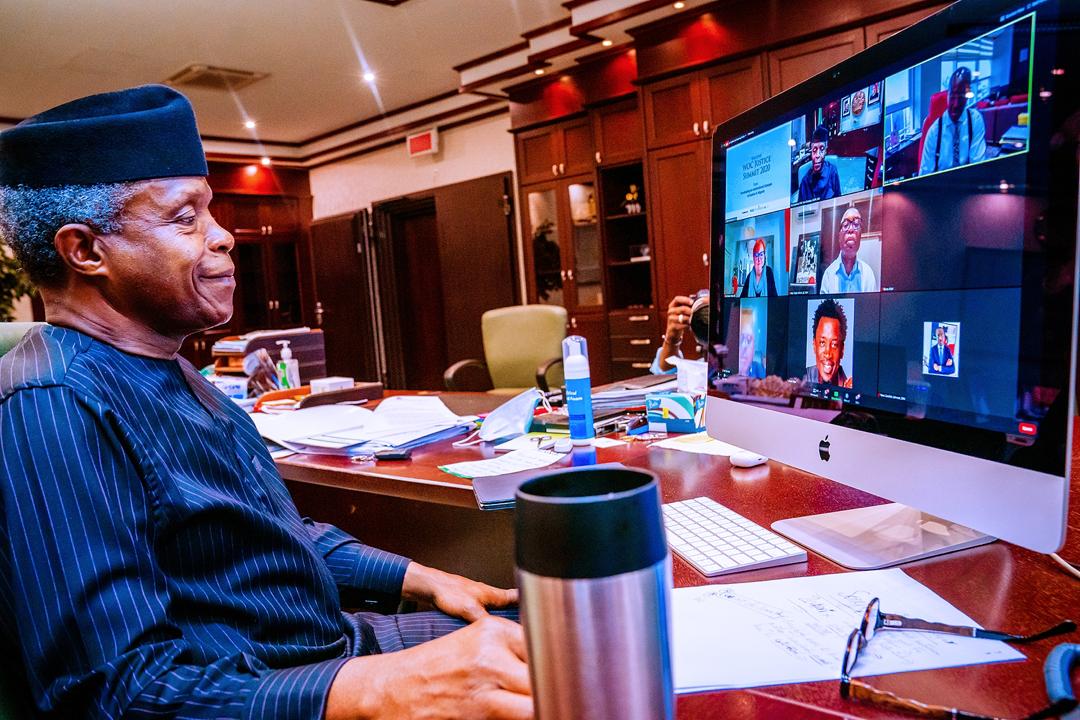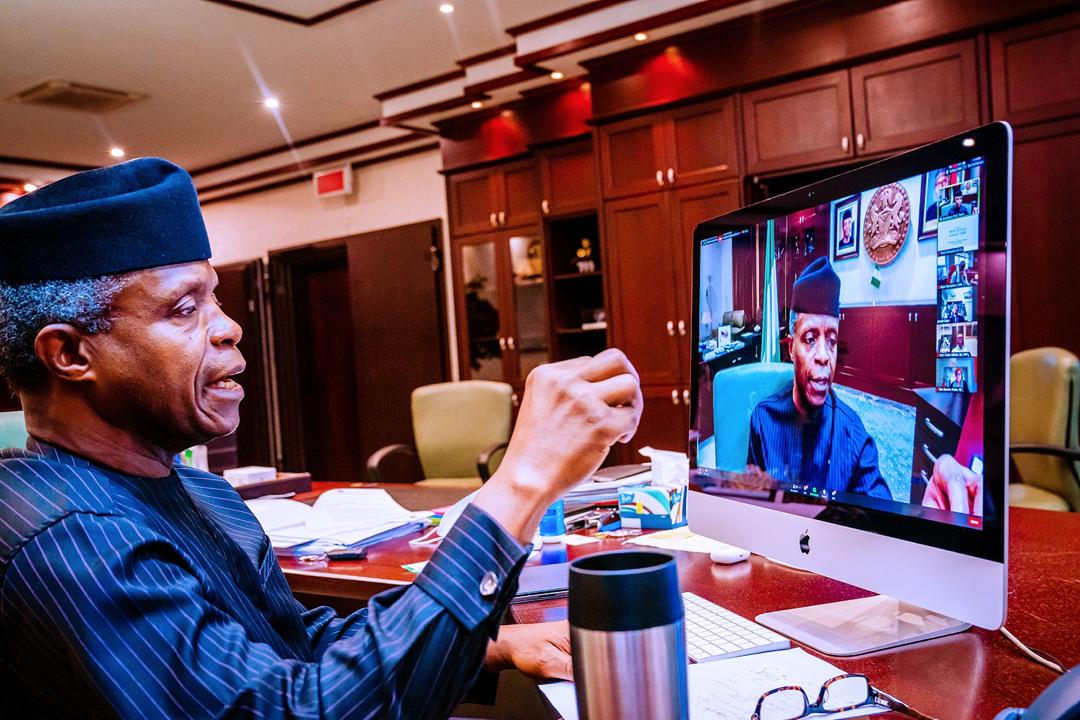VP’s Remarks At Wole Olanipekun & Co Justice Summit Webinar
REMARKS BY HIS EXCELLENCY, PROF. YEMI OSINBAJO, SAN, GCON, VICE PRESIDENT, FEDERAL REPUBLIC OF NIGERIA AT THE WOLE OLANIPEKUN & CO JUSTICE SUMMIT SATURDAY AUGUST 22, 2020
I am extremely grateful to the firm of Wole Olanipekun & Co. – conveners of this all-important conversation on our system administration of Justice for their kind invitation.
Chief Wole Olanipekun SAN, is, without doubt, one of the most consequential lawyers not only in our country but perhaps in the Commonwealth.
Today, his exceptional success with novel constitutional constructs is swiftly becoming the stuff of legend. But these days, he is doing his best to enjoy the very huge fruits of his labour and has sensibly handed over the tougher parts of running the law firm to his two exceptionally brilliant chips off the old block – Dr. Dapo Olanipekun SAN, and Mr Bode Olanipekun SAN.
I commend you both for this exceptional idea and the execution of this summit.
This theme covers a broad remit and after listening Oditah covering a wide range issues, and with such incredibly appropriate examples and illustrations, one really will rather not say anything but just go straight to the discussions so that we can make contributions.
So, what I would rather do is to focus my comments on the responsiveness of our system of administration of justice to the ends of social justice.
We are at a moment in history like no other, a global pandemic of a magnitude, probably, never seen before and the worst global economic decline in a century. But economies like politics is local. Here in Nigeria, we were already grappling with issues of poverty, entrenched inequality, disparities in access to social and economic opportunities, constraints to access to and exiting justice, and diminishing faith in governing institutions. At the same time, insecurity in parts of the country stretching our law enforcement infrastructure to its limits.
But we are also at the most technologically advanced moment in human history and this is the same for us in Nigeria. With Artificial Intelligence, the internet of things and now 5G redefining commerce, medicine, entertainment and even how we work and play.
The conflation of these events is both enormously exasperating but also incredibly hopeful time. For our system of justice. It offers great opportunities and we must not diminish the importance of these opportunities.
We are faced today, with demands for both structural and philosophical change in our administration of justice system.
The big question is also the relevance of our paradigms of justice to the major socio-economic circumstances that confront us. The law is a social construct and makes sense only within a social context. To treat the law as something apart from society, or as a body of technical abstractions is to strip it of meaning and to alienate the legal order from the very people it is meant to serve.
Consequently, a definition of justice that focuses on the social and economic rights of the people is not only more meaningful, it is more just. These rights include the right to food, shelter, employment, education and a reasonable national standard of living, care for the elderly, pensions, unemployment benefits and welfare for the physically challenged.
Our progress in the observance of socio-economic rights must also be prosecuted in terms of the struggle to reduce the basic problems of ill-health, malnutrition, illiteracy, and famine which daily afflict our people.
Where social and economic rights are unsecured, people are unable to fully maximize their civil and political rights. For instance, access to qualitative education enhances and enriches the freedoms of expression, thought and conscience.
Conversely, pervasive illiteracy can nullify the entire idea of the freedom of the expression. In the progressive vision, political rights and socioeconomic rights are mutually reinforcing.
But socio-economic rights even where wholly justiciable mean nothing unless there is a fiscal commitment to enforcement. This is the crucial intersection of politics, ideology and notions of justice.
This may explain why the opposition in Nigeria was prepared to abolish our social investment program if they won, while our party’s understanding of the imperative of delivering social justice was the provision of a massive social safety net.
This was a fundamental feature of our manifesto. So, our Social Investment Programme which is the most ambitious welfare programme on the continent and our effort to expand universal health insurance all aim at ensuring that our most vulnerable citizens are not abandoned to the vicissitudes of fate.
Consequently socio-economic rights find fiscal support are absolutely crucial and if they don’t find support, the whole cause is lost.
It is of course evident that without social justice, legal justice is ultimately unattainable. The degree to which citizens are in possession of their social and economic rights has a direct impact on the degree of their access to legal services and thence to justice.
Our Constitution asserts that “the independence, impartiality and integrity of courts of law, and easy accessibility thereto shall be secured and maintained.” It is significant that the framers of our Constitution enshrined access to justice along with social and economic rights in the Directive Principles and Objectives of State Policy. And this indicates that they saw access to justice, the integrity of our justice system and socioeconomic rights as related imperatives.
There is also a growing recognition in criminal justice that the model of adjudication that we are accustomed to and which largely dispenses retributive justice is not entirely adequate to meet the demands for justice in the various complex scenarios and situations that confront a developing country like ours.
Given the tensions and frictions generated by contending passions and grievances and the social reality of inequality and inequity, there is also a recognition that some of the most serious situations which threaten to sunder the fabric of society require much more than just retributive sanctions by our judicial system. They require restorative justice to bring about healing and the reconstitution of our communities. This is one of the approaches that we are looking at as part of our efforts to resolve protracted ethnic and religious conflicts. In many of the cases, it is not enough to arrest, detain, prosecute and jail terrorists or someone who has abducted children for many months. There is a need somehow to find a process by which restorative justice can be brought to bear, by which the communities’ feelings of violations can be assuaged
Already the National Policy on Justice embodies some of these prescriptions and offers pathways of innovation for more holistic approaches to justice delivery. There is still much work to do in this respect.
But there are also infrastructural issues to be addressed. How do we ensure that we attract and appoint only the best amongst us to the bench? What can we do about unreasonable delays in justice delivery? How will technology affect our administration of justice system? What needs to be done to maintain the integrity of our judicial process and outcomes?
To take the easiest first. There is little doubt that technology has already permanently changed the way we do business. The Supreme Court, in the wake of the pandemic, endorsed virtual court proceedings. Digitization of trial processes is now inevitable and there are many easy to use models. This will by itself, in my view, will impact trial times, recording proceedings will be far easier.
But the important correlation between the cost regime and the speed and efficiency of trials again is a very crucial issue. We cannot have the cost regime we have today and expect that lawyers will not engage in dilatory tactics especially when a lawyer knows he has no case.
We must take the opportunity also to rewrite procedural rules, to remove needless processes and rituals. Again, to the point made by Fidelis, it is has given rise to the most absurd outcomes – the obsessive elevation of form over substance. This is obviously a matter that we must take seriously and address, not just as professionals but we must involve all the arms of government. I had the privilege of speaking at a webinar and this matter also came up.
I think it is important for us to sit together – the leadership of the profession, the executive, the judiciary and the legislature, to take a second look at some of these issues. In some of the judgments, there have just been unnecessary emphasis on technical outcomes where the entire justice of the case is made ridiculous. When a case is decided right, when justice is done, practically everybody feels that justice has been done. Every time that technicality is raised over the justice of the case, it leaves a sour taste in the mouth and everybody feels something has been violated.
On judicial appointments a merit based system is absolutely necessary, we need to insist on mandatory tests and interviews for all applicants. Clearly, we need to look more carefully at how our judges are selected. There has to be an objective process of selecting judges. We cannot insist that the only way to become a judge is to be a career person or move from the high court to the court of appeal, to the Supreme Court. We must be able to bring in practicing lawyers, academics to be justices of the Court of Appeal and Supreme Court. If it requires rewriting the rules, then let us rewrite the rules.
We in the legal profession, even if only for self-preservation and preserving our means of livelihood, we have no higher objectives. We owe it to ourselves to change all of what we are seeing and it means engaging with the government – the executive and the legislature fully, to change some of these things, and I think the case is very clear and evident, that change is necessary and that the reform our judicial system is urgent. Every minute of delay simply worsens the bleeding.
Thank you very much.




